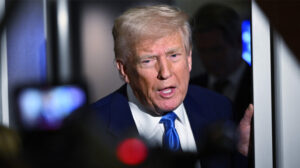In the midst of a trade war with China that has caused panic in financial markets, the US has revised its position by exempting smart phones, computers and some other electronic products imported mainly from China, from the recent ‘reciprocal’ tariffs imposed by President Donald Trump, giving a big breather to tech companies, such as Apple, that rely on imported products.
In a departmental briefing, the US Customs and Border Protection agency released a list of specific codes that are exempt from import duties, retroactive to April 5. This includes 20 product categories, such as code 8471, which covers all computers, laptops, hard drives and automatic data processing. Also included are semiconductor devices, equipment, memory chips and flat panel computer monitors.
No explanation for the decision was given in this update, but the exemption gives breathing space to U.S. consumers who are at risk of seeing prices of these popular products skyrocket. It will also benefit tech giants like Apple, which makes its iPhone and other top products in China, and Dell Technologies. The exempted products account for more than 20 percent of U.S. imports from China, according to U.S. Customs data cited by Gerard DiPippo, an expert researcher on China issues.
Asked yesterday (local time) about the reasons for the exemptions and the semiconductor plans, Trump told reporters on board the presidential aircraft: “I’ll give you that answer on Monday. I’ll be very specific on Monday.”
Dan Eaves, an analyst at Wedbush Securities, said the announcement is the most positive news anyone could hear this weekend.
“There is still uncertainty and volatility with these negotiations with China…The big tech giants like Apple, Nvidia, Microsoft and the broader tech industry may get a big breather this weekend into Monday,” Ives said in a note.
The exceptions suggest that the Trump administration is becoming increasingly aware of the impact that tariffs can have on consumers. Even with a lower tariff rate of 54% on Chinese imports, analysts predict that the price of a top-of-the-line Apple iPhone model could rise to $2,300 from $1,599. With a tariff rate at 125%, economists and analysts say that could effectively put a brake on U.S.-China trade.
Smart phones were the top US import from China in 2024, totaling $41.7 billion, with Chinese-made laptops coming in second at $33.1 billion, according to the US Bureau of Statistics. Apple recently chartered cargo planes to transport 600 tonnes of iPhones, or about 1.5 million mobile phones, to the US from India after it increased production there in an effort to counter Trump’s tariffs.
Ask me anything
Explore related questions





